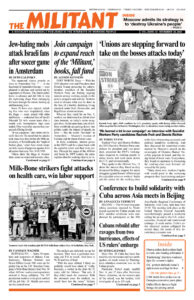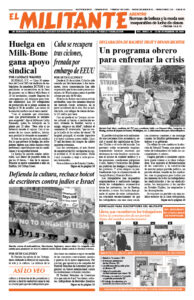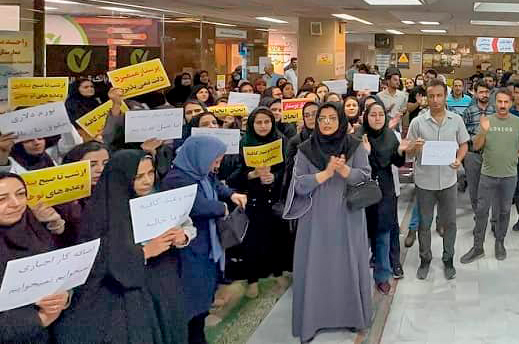Nurses and other health care workers at hospitals in at least 17 cities held protests or took strike action leading up to and on Iran’s National Nurses Day Nov. 7. They are protesting low wages, mandatory overtime, understaffing and poor working conditions.
“We are nurses, not slaves! Without nurses, the system collapses,” said a Nov. 9 statement from the Coordinating Council of Nurses’ Protests. As the government attempts to use its deepening conflict with Israel to convince workers not to protest, the council responded, “Enough warmongering. Our table is empty.”
“Our colleagues in Yazd and Shiraz have been at the forefront” of this round of protests, the council reports. Protests in Yazd, above, went on for seven days in a row. In Shiraz, workers at four hospitals held a “full strike” with “partial strikes” at two others. In August nurses and other hospital workers held protests or went on strike at over 60 hospitals and health centers in 40 cities.
At the official Nurses Day ceremony in Tabas, in the South Khorasan province, in Mashhad and other cities nurses intervened with protest signs and took the floor to raise their demands. In other cities nurses boycotted the government-sponsored events and wore black ribbons in protest.
“We overwork the nurses while we do not pay them proper salaries,” Mahmoud Umidi, an official of the Nurses House, a government-recognized association, told the Tehran-based Iranian Labour News Agency.
The average wage for nurses at public hospitals in Iran is $200 a month, and even that is often paid weeks or months late.
To make up for what Iran’s Ministry of Health admits is a shortage of 70,000 nurses, many hospitals impose mandatory overtime.
As many as 1,500 nurses emigrate to Germany, Switzerland, Australia and elsewhere every year, where they can earn more than 20 times as much. Others, fed up with the low wages and bad conditions, just quit and stay at home or find other jobs, including at private clinics offering cosmetic surgery.
The protests and strikes “will continue until we win our inalienable trade union rights,” the Coordinating Council of Nurses’ Protests said.


